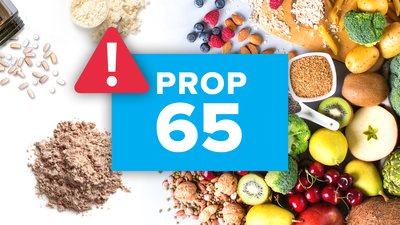The Major Takeaways
- A Prop 65 warning on your food or supplement label doesn't necessarily mean the product is unsafe, or that you shouldn't take it.
- Prop 65 warnings can be found on the packaging of almost any product you buy, from protein powders and breakfast cereals to jeans and gardening shovels.
- You may see a warning label on a product that contains safe levels of a substance. Plenty of companies cover their legal bases by putting a label on their products, even if it may not be necessary.
- It's not all man-made chemicals or petroleum by-prodcuts in question; often it's something naturally occurring in food.
- The science in cancer claims isn't black and white; often it's based on animal studies.
- Prop 65 chemicals and their respective "safe use" thresholds are only recognized in California, not by any other federal or international regulatory body. The FDA has criticized and overulled Prop 65 in some cases.
- The conversation about Prop 65 definitely isn't over yet. Where it ends up could be quite different from where it is now.
Prop 65 is a piece of legislation that's unique to the State of California and, in theory, only applies to products sold in, and to commercial establishments within, that state. And to be clear, Prop 65 is a well-intentioned piece of legislation. Its purpose is to increase public awareness about the potentially dangerous stuff you may not realize is in the products you buy. It takes the form of a label on a product saying something along the lines of:
WARNING: Consuming this product can expose you to chemicals including [name of chemical(s)/chemical class(es)], which is [are] known to the State of California to cause cancer and birth defects or other reproductive harm. For more information go to www.P65Warning.ca.gov/food.
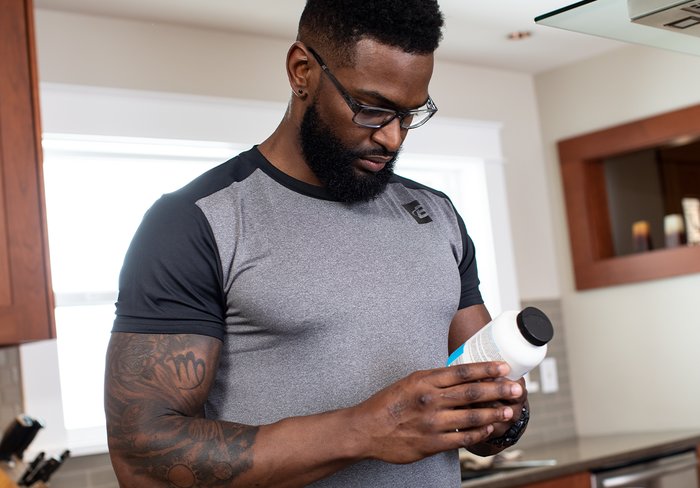
When you see this, it allows you, a (theoretically) California resident and consumer, to make more informed decisions about what you purchase. It tells you how a particular product could affect your health or that of your offspring. Sounds great, right?
And it's that kind of messaging that helps explain why 63 percent of California voters approved Prop 65 when it was on the November 1986 ballot and why the State of New York is currently considering a similar bill.
Of course, like many pieces of legislation, there are all kinds of puzzling and potentially contradictory ways in which the warning is applied. For example, it's usually on hotels or apartment complexes…but not government agencies or facilities. It's on all kinds of drinks…but not on public water.
But let's not focus there. Instead, let's focus on how the law affects the products you buy, and what you need to know as a supplement buyer. For instance, does the mere presence of such a warning on a product's label mean that the product is unsafe to consume? Or conversely, that a competing product void of the warning provides better safety?
The short answers: No, and no. Prop up a stool and read on for the details.
1. It's Not Just Californians Who Have to Deal with It
Prop 65 was created in a pre-internet age, by Californians, to inform Californians about potentially toxic chemicals in the drinking water. However, 30-odd years down the line, Californians definitely aren't the only ones being affected by Prop 65.
The success of online retailers, such as Bodybuilding.com, and a zillion other forms of distribution, has, over time, created a logistical environment where it's pretty impractical and cost-prohibitive for most small-to-medium-sized businesses to manufacture state-specific packaging. For this reason, companies have to create one-size-fits-all labels to avoid California-specific lawsuits, and consumers nationwide are finding Prop 65 warnings on products they buy.
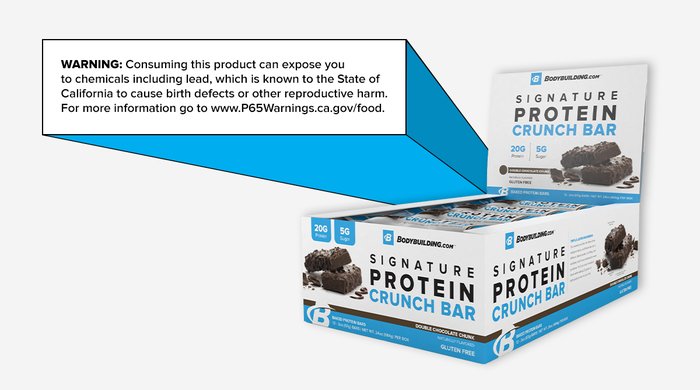
Since people in, say, Idaho aren't familiar with the conversation around Prop 65 that's been going on in California, they rightfully find themselves wondering: Is this supplement going to give me cancer? Cause birth defects? Make me keel over dead on the sidewalk?
To clear up the confusion this nationwide visibility has created, we need to look behind the labels.
2. You May See a Warning Even if a Product Has "Safe" Amounts of a Substance
Without context, the mere presence of the Prop 65 warning on a product would imply toxicity and could scare you away from purchasing one product over another. After all, why would you willingly choose to buy and ingest poison?
If only it were that simple.
Each year since Prop 65 was first passed, California's Office of Environmental Health Hazard Assessment (OEHHA) has been required to update a list of chemicals that the Golden State deems will likely, probably, or possibly cause cancer, birth defects, or reproductive harm. Presently, that list contains about 900 chemicals. Some, like certain pesticides, herbicides, and many petroleum-derived byproducts, are entirely manmade. Other chemicals on the list, like the heavy metal arsenic, can also occur naturally within the soil or water, and therefore become present within the plants or animals grown or raised within such conditions.
A twelve-person panel of appointees serving on a committee, aptly named the Scientific Advisory Panel, are responsible for recommending to OEHHA what chemicals should be on the Prop 65 list. The Scientific Advisory Panel also sets the criteria for being included on the list, and the quantity of any such chemical that a product may contain before being deemed unsafe.

Theoretically, products containing Prop 65 listed chemicals at an amount that OEHHA has deemed to be within safe levels when the product is used as directed—known as a "Safe Harbor Level"—should not display a Prop 65 warning. However, many still do.
Here's where things get complicated, and the list gets so big. There are many substances where a safe harbor level hasn't been established. More than 60 percent of the chemicals on the list, in fact.
What then? If any of those chemicals are present in a product, even if barely detectable, then California requires that manufacturers put a warning on the label.
So, practically speaking, if a product you buy—dietary supplement, food, clothing, electronic device, furniture, gardening shovel, beer mug, sex toy, Halloween costume, velvet artwork of dogs playing poker, etc.—is known or found to contain one of the chemicals included within the Prop 65 list and the chemical doesn't have a safe harbor level, or is present within the product in an amount above OEHHA-established limits, then you're likely to see a warning on the label.
3. The List Has Some Familiar Names on It
If you look at the chemicals and chemical classes that appear on the Prop 65 list, you'll find you don't need a chemistry degree to recognize at least some of the names. Just a few from the list include:
- Alcoholic beverages, all-trans retinoic acid (a derivative of Vitamin A often used in acne creams), aloe vera (particularly, the non-decolorized whole leaf extract), anabolic steroids, androstenedione, angiotensin converting enzyme (ACE) inhibitors, inorganic forms of the heavy metal arsenic, as well as asbestos and aspirin.
Wait, what was that part about alcohol?! You read right.

An air filter that contains asbestos? Yes, probably best to avoid that. But a jug of red wine with a warning that it contains alcohol? I would hope so. Otherwise, someone owes me my $1.99 back!
All jokes aside, isn't there all that evidence that suggests consuming red wine in moderation can benefit your health? Asbestos, not so much. So why would both substances require the same cancer warning?
Oh, what a Pandora's box that question opens.
4. The Cancer Claims Aren't Always Based on Human Science
Any chemical that OEHHA's Scientific Advisory Panel determines, or that the California Labor Code, or any of a number of other state or federal agencies classifies as a "carcinogen" or can cause developmental or reproductive toxicity can be added to the Prop 65 list.
Great, right? The wider the net, the better and safer we all are! If only science were that simple.
"Cancer classification from one authoritative body, called the International Agency for Research on Cancer (IARC), are especially problematic," reported the Center for Accountability in Science's (CAS) 2018 Proposition 65 State Impact Report.

The problem with using the IARC's list of cancer-causing chemicals, according to the CAS report, is that "Evidence that the chemical can cause cancer in humans does not need to exist. Experimental animal data is sufficient, even if in doses far higher than any person would reasonably encounter…even if no human evidence exists to suggest real-world human exposure increases one's risk of cancer."
So yes, there's a lot of gray area there, and a lot of cases where someone could see a label on a product that, let's be frank, poses little to no health risk to them—and may actually be healthy. This became especially clear in the case of one substance: the chemical compound acrylamide.
5. The FDA Has Called Prop 65 "Misleading"
Acrylamide is naturally present in certain foods and can also be formed during high-temperature cooking, such as frying, baking, or roasting. It's on the Prop 65 list, has made headlines more than a few times within the past several years, and it has come to represent several of the big problems with Prop 65 in its current form.
Initially, acrylamide gained notoriety due to its presence in french fries (interpreted as "french fries may increase risk of cancer"). But the big news was when a judge ruled that coffee-containing products, as well as California-based coffee shops and places that served coffee, were required to post Prop 65 warnings because coffee beans produce acrylamide when roasted.
Uh-oh. Fertilizer-flavored baby food is one thing. But when they came for coffee, it was apparently too far.
After the ruling, the Food & Drug Administration (FDA) stepped in and put its weight behind the safety of coffee—and cast into question some fundamental parts of Prop 65. In an August 2018 statement from then-FDA Commissioner Scott Gottlieb, MD, the agency argued against the implementation of Prop 65 warnings on coffee, and indicated the State of California itself may have violated Federal law by requiring companies to mislead consumers.

Gottlieb wrote:
"Simply put, if a state law purports to require food labeling to include a false or misleading statement, the FDA may decide to step in…That's why we were deeply concerned when a court recently ruled that a California law—known as Proposition 65—may require coffee sold in California to be labeled with a cancer warning because of the presence of a chemical called acrylamide…But requiring a cancer warning on coffee, based on the presence of acrylamide, would be more likely to mislead consumers than to inform them…In fact, as our letter to California states, such a warning could mislead consumers to believe that drinking coffee could be dangerous to their health when it actually could provide health benefits. Misleading labeling on food violates the Federal Food, Drug, and Cosmetic Act. No state law can require food to bear a warning that violates federal law."
If that quote was long enough to cause attention-span defects in your brain, the short version is:
- Certain amounts of naturally occurring chemicals are unavoidable.
- A chemical may be harmful in one context, such as when consumed in high doses, but the mere presence of the chemical within an otherwise healthy food/food ingredient doesn't make that product unsafe unless proven otherwise.
- Requiring warnings on products without taking points 1 and 2 into consideration is misleading, and in violation of Federal labeling laws.
- The FDA, not the State of California, is the final authority on food safety.
Coffee eventually came off of the Prop 65 list, but the importance of this incident was larger than that. Of particular importance within the FDA's statement is the need to establish realistic thresholds, particularly for naturally occurring chemicals. But as you may recall, there aren't established thresholds for over half of the substances on the list. And in the case of acrylamide, for example, the Prop 65 "safe harbor" level is 220,000 times lower than what the Environmental Protection Agency (EPA) has concluded may cause cancer.
Let's repeat that in case you haven't had your coffee yet: 220,000 times lower.
Critics say that's bonkers. And it's hard to argue against them.
6. Some of Your Favorite Supplements Are Probably on the List
Specifically, let's talk about protein and fish oil, two of the products that I recommend to people most often, and which have the biggest and most loyal followings in fitness culture. Both are also common carriers of the Prop 65 warning.
Here's why: The heavy metals lead, arsenic (in its inorganic form), cadmium, and mercury (methylmercury form) are among the most targeted of the Prop 65 chemicals that affect dietary supplement companies. Each of these metals are common within the food supply, mostly as byproducts of pollution, from pesticides and fertilizers used in many non-US countries, the burning of fossil fuels, geological leaching (e.g., volcanic activity), or decomposition of metals and materials either from prior industrialization or processing equipment aging.
There's nothing special about protein or fish oil supplements that makes them especially prone to toxicity. Really, it's just that they're made of common ingredients that are vulnerable to Prop 65.
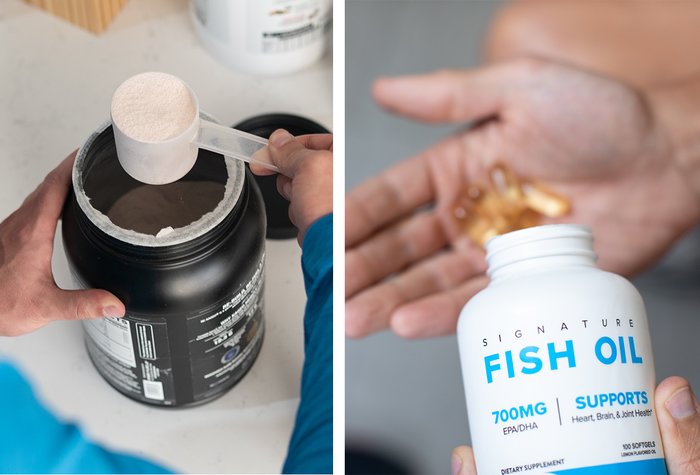
For example, supplements derived from large fish or other aquatic sources are often at risk of violating Prop 65 for mercury. Rice is commonly high in arsenic. Cocoa powder, shellfish, mushrooms, and root crops such as potatoes and herbals are prone to concentrating cadmium.
Therefore, a chocolate whey protein powder, vegetable-based protein powder, or meal replacement are fairly likely to fail Prop 65 testing for at least one of the heavy metals, both because they contain cocoa powder, and because such supplements have large serving sizes. A purified caffeine anhydrous capsule product may be far less likely.
Does it mean that one product is safer than the other? No, it doesn't.
7. There's More to Lose by Not Having a Warning than by Having One
These are maximum allowed amounts of each of the aforesaid heavy metals that may be consumed, per day, from a product before a Prop 65 warning is required on the label:
Heavy Metal
- Inorganic Arsenic: 10 mcg/day
- Cadmium: 4.1 mcg/day
- Lead: 0.5 mcg/day
- Methylmercury*: 0.3 mcg/day
*No Safe Harbor Level has been established for methylmercury or other mercury compounds, but prior legal settlements refer to this concentration as precedent.
In other words, not much. So, let's consider a product that's found to contain 4.0 micrograms per serving of Inorganic Arsenic, 0.5 micrograms of Cadmium, 0.4 micrograms of Lead, and less than 0.01 micrograms of Methylmercury. You would probably conclude that the product can be marketed without a Prop 65 warning, correct?
Possibly. But in many cases, probably not.
For such a product to avoid carrying a Prop 65 warning, companies must show more than just the number above. They must demonstrate that:
- The product's instructions for use recommend no more than one serving be consumed per day (i.e., at two servings per day, Lead would be in excess of the Safe Harbor Level allowed);
- The company doesn't recommend that the product be combined, or stacked with other heavy metal contributing products that when calculated together exceed Prop 65 limits; and
- The company can provide convincing evidence that the average consumer of the product does not consume more than one serving of the product per day.
But even if they can show all of those things, there's still a good reason for a company to put the label on: simple risk aversion.
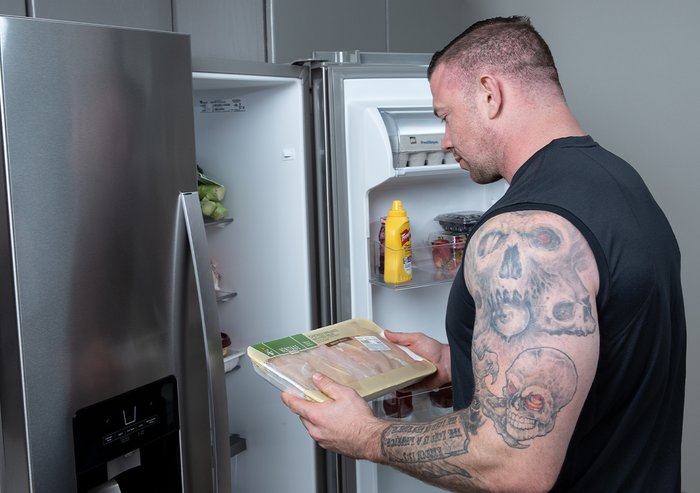
For companies with products that find their way into the State of California and that don't possess a Prop 65 warning, the costs can be astounding. The law allows a penalty to be levied against a company of up to $2,500 per violation, per day, for failing to provide a warning. And no, it's not just qualified inspectors who can start proceedings against a company.
The law also states that in addition to the California Attorney General's office and any district or city attorney's office having the authority to enforce Prop 65, "any individual in the public interest may enforce Proposition 65 by filing a lawsuit against a business alleged to be in violation of this law." (Emphasis added by the author.)
Cue a lot of lawyers rubbing their hands and saying, "Oh yeah."
8. It's a Goldmine for "Shake-Down Artists"
"On paper, [Prop 65] is one of the best laws ever," says internationally recognized legal authority in all things sports nutrition, Rick Collins Esq, CSCS, of Collins Gann McCloskey & Barry PLLC and General Counsel to the International Society of Sports Nutrition (ISSN). "[The law] was originally intended to protect consumers from potentially toxic chemicals that may be present in California's drinking water sources. Who's going to argue with that? Unfortunately, the FDA and California's Attorney General can't be everywhere. So providing this individual right-of-action clause within the law seems like a good thing," says Collins. "Unfortunately, the way it has worked out, it has created some bounty-hunting shake-down artists."
Compounding the potential for abuse, the law allows the plaintiff (the one doing the suing) to collect up to 25 percent of the total penalty awarded, and plaintiffs may also choose to request payments from a defendant rather than face further civil action against the company for the same product. This has predictably led to some Tony Soprano tactics, or as an article on the trade website FoodNavigator-USA.com described it, "Some lawyers argue that Prop 65 has turned into a form of 'legalized blackmail.'"

Let's put some numbers behind that claim. According to the 2018 CAS Report, Prop 65 has cost businesses more than $310.6 million between the years 2010 and 2017. That panned out to about 11 settlements per week since 2010, with the trial lawyers pocketing an estimated 70 percent of all settlement proceeds and judgments. Of the estimated $182.1 million in total settlements paid out by businesses during that period, that's $128.5 million, or $30,000 per successful settlement, that goes straight to the lawyers.
By also requesting payments in lieu of further civil action (aka, shakedowns), these same trial lawyers are reported to have collected an additional $22.5 million. Since the lawyers and law firms that file the majority of the suits are also the plaintiffs within the civil suits, and subject to be awarded up to 25 percent of the lawsuit judgement, the CAS report estimates that the lawyers have "successfully extracted up to (an extra) $30.2 million for themselves between 2010 and 2017." Gross.
Unfortunately, both the number and amount of these settlements continues to grow each year, and a new amendment to Prop 65 is likely to open the floodgates further. Quoted within the FoodNavigator-USA.com article, attorney Michael Steel, of Morrison & Foerster, paints an alarming picture of what's to come: "You don't even have to leave your living room. You just go online and start shopping, then spend a couple hundred bucks on a lab test, and you could get $20,000 out of a company."
9. Having that Warning Label Can Actually Be a Good Thing
There are three exceptions that allow a company to market its product within the State of California without a warning, even if Prop 65 chemicals are present within the formula, or in excess of Safe Harbor levels:
- The company can provide scientific evidence that exposure to the levels of the chemical(s) present within the product do not result in excess of one case of cancer per 100,000 individuals exposed to the product over a 70-year lifetime, and exposure at 1,000 times the level present within the product produces no observable negative effects on reproduction or development.
- The concentration of the chemical(s) present within the product are naturally occurring (e.g., "natural geological processes, or toxins produced by the natural growth of fungi").
- The supplement company and each business within the manufacturing and distribution chain employ nine or fewer employees, each.
So let's say you bought an artisanal pre-workout in a mom and pop supp shop. It doesn't have a Prop 65 warning. That means it's free and clear and meets all three of those standards, right? Uh, no.
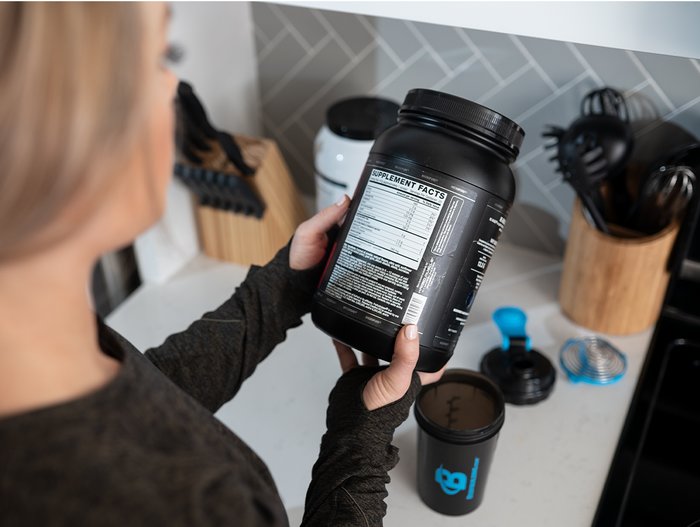
For smaller companies, a lack of a warning label could just mean they perform little or no testing at all, or they simply have yet to be confronted with a Prop 65 lawsuit. On the other hand, companies that market products that do carry a Prop 65 warning can indicate some good things, including:
- The company is probably receiving legal counsel.
- The company is investing in at least some analytical testing on its finished product (even if minimal).
- If they do testing, you can ask to receive a copy of the company's analytical results for the Lot number stamped on the product, and assess for yourself if you're comfortable with the amount of the Prop 65 chemical present within the product before you purchase or continue consuming the product.
If you have any concerns or questions, don't be afraid to ask the company.
10. The Prop 65 Conversation Isn't Over Yet
We're over 30 years into Prop 65, and honestly, it seems like the debate around it is picking up faster than ever. And it's about time!
In the meantime, what everything I've said so far means for supplement users is simply this: Don't fear the Prop 65 warning or reject a product immediately because the warning is on there.
Honestly, it's an opportunity as much as it's a warning. It's an opportunity for you to learn a little about the chemicals all around us that we consume on a daily basis, and be a more informed purchaser. It's an opportunity for supplement companies to up their game, own their ingredients, and be as transparent as possible. And it's an opportunity for governmental agencies to close the shyster loopholes and build a more honest, effective relationship with supplements and how they want to regulate them.
Yes, there's a lot of room for growth for all three of those groups. But each public debate and each company that honestly engages with their users brings us a little closer to moving in the right direction.

